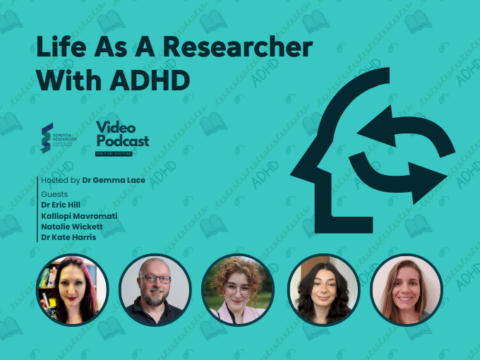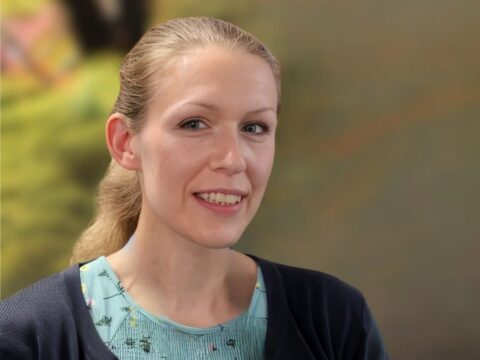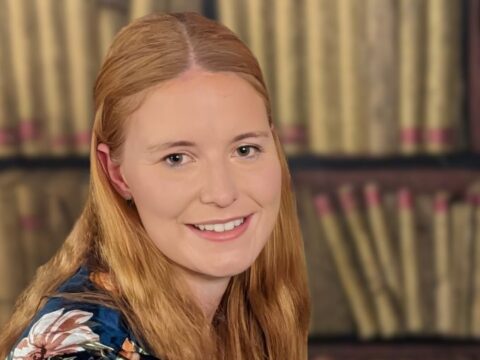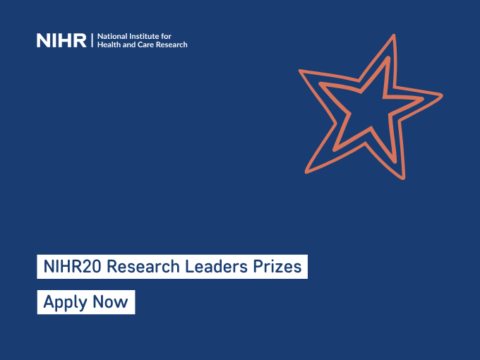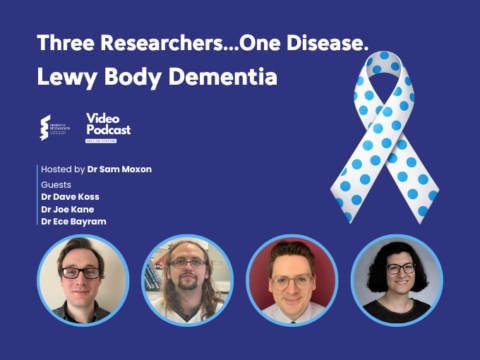In this weeks podcast Megan Calvert-O’Hare talks to Emily Oliver and Naomi Gallant who are both Clinical Doctoral Research Fellows at the University of Southampton.
Emily and Naomi discuss their research into NHS Dementia Care, which focuses mealtimes and relational care. They also discuss their work with the NIHR Collaborations for Leadership in Applied Health Research and Care (CLAHRCs) in Wessex, and how the organisation supports their work and research.
There are around 450,000 people with a diagnosis of dementia, and when we further consider those with some form of cognitive impairment, the numbers are probably more than double that. When you consider that on average people with dementia have two of more co-morbidities, it’s should be no surprise that sadly there is a lot of time spent in and around hospitals, as both in-patients and out-patients.
To find out more about the NIHR CLAHRC visit their website here.
Voice Over:
Welcome to the Dementia Researcher Podcast brought to you by dementiaresearcher.nihr.ac.uk, a network for early career researchers.
Megan Calvert-O’Hare:
Hello. There are around 450,000 people with a diagnosis of dementia in the UK and if we include those with some form of cognitive impairment, the numbers are probably more than double that. When you consider that on average, people with dementia have two or more co-morbidities, it is sadly no surprise that people with dementia spend a lot of time in and around hospitals, as both inpatients and outpatients. Providing respectful care is therefore very important. I’m joined today by Naomi Gallant and Emily Oliver, who have focused their research on how the NHS can improve care for people with dementia while in hospital.
Megan Calvert-O’Hare:
Both are clinical doctoral research fellows funded by National Institute of Health Researchers Collaborations for Leadership in Applied Health Research and Care, working in collaborative partnership with the University of Southampton and the surrounding NHS organizations in the Wessex area.
Megan Calvert-O’Hare:
Naomi Gallant is an occupational therapist in the final year of her PhD. Emily Oliver is a mental health nurse also in the final year of her PhD. A warm welcome to you both. Should we start with your research questions, Emily?
Emily Oliver:
Yeah, so my research is looking at the contextual factors of the acute care ward and how that affects relational care between nursing staff and patients with dementia. So, we know from lots of reports that relational care isn’t very good in hospital. We’re looking at the Francis Report. So my research is looking at why that is. So, I did a qualitative research study, so I did observations of care and then I did interviews with staff just to look at what was happening on the ward. And a lot of the reports the nurses talk about not having enough time, and then that’s sort of accepted and I wanted to understand why, what are they doing instead? What’s their priority? So yeah, I did, it was an ethnographic study.
Megan Calvert-O’Hare:
Okay. And Naomi.
Naomi Gallant:
Hi. Yeah. So, my research is also looking at dementia care in hospitals, but particularly focusing on meal times. So again, from the research that’s already been done, we know that people with dementia in hospitals will often lose weight when they go into hospital. Various reasons for that. We also know that lots of intervention studies show the actually quite poor results. There’s not many interventions that you’d say, “Oh yeah, that works, that will get people to eat.” So, what I really wanted to know was what influences whether people eat or drink or not, people with dementia, and also how are they experiencing mealtimes, because there’s not really a lot out there really looking at how people with dementia perceive what’s going on around them.
Naomi Gallant:
So, I did a two phase study. The first one was observational using the dementia care mapping tool, which is from Bradford University and that’s their wellbeing score. So, I did observations for three hours over meal times before, during and after, and measured their wellbeing and engagement levels at that time. And then alongside that I did qualitative field notes. So, I have like a mixed method split for the first bit. And then my second phase is interviewing staff. So, I did semi structured interviews and at the moment I’m working on bringing all those results together.
Megan Calvert-O’Hare:
Yeah. Because as we said in the introduction, you’re a final year, PhD.
Naomi Gallant:
Very nearly there.
Megan Calvert-O’Hare:
So Emily, you were involved in relational care. So did you mainly talk to staff members and, like you said, nurses who say they don’t have enough time?
Emily Oliver:
Yeah.
Megan Calvert-O’Hare:
Is that, did you have any contact with patients? Were you try to link up the two or was it mainly staff?
Emily Oliver:
So, during the observations I spoke to patients. Just spoke about the care that they had and then that was more of an informal chat, because what I found was, if you tried doing interviews with people with dementia on acute hospital ward, it was so difficult to find a space, to do it at a right time. So, it was just easier to have those informal chats during the observations.
Megan Calvert-O’Hare:
We had a podcast about ethics a few weeks ago.
Emily Oliver:
Oh yeah.
Megan Calvert-O’Hare:
I just wondered how that fits in, like informal chats with patients in hospital surroundings, how does that fit with the ethics of your project?
Emily Oliver:
So we’ve had quite a few conversations about this and I thought actually because we were healthcare professionals, Ethics Committee were actually quite lenient with what we did. I don’t know if you found that as well? Because a lot of the problems are usually around consent and capacity. And actually they understood that because we are healthcare professionals, we’re making those decisions all the time. So, yeah I think they were quite lenient weren’t they really?
Megan Calvert-O’Hare:
Yeah, because your background is occupational-
Emily Oliver:
So, I’m a mental health nurse. So almost. Naomi’s an occupational [crosstalk 00:05:02].
Megan Calvert-O’Hare:
Okay, and do you think that’s helped both of you actually, cause you were the occupational therapist, your backgrounds have helped inform your research a lot? You know, you’re not going straight from undergrad into a PhD, you’ve got some training behind you. Do you think that’s helped?
Naomi Gallant:
Definitely. For me, I feel like my clinical work that I did before I started the PhD really shaped where my passion was and where I wanted to do the research and particularly … So again, mine’s around meal times and I was in a dementia setting that I worked in. I was asked as an occupational therapist to do meal time assessments, but there’s no evidence out there to say that’s what occupational therapists do. So, that sort of got me thinking about what research is out there.
Naomi Gallant:
So yeah, I’d definitely say that the clinical sites shaped how I got to it, but also doing research. But one of the things I’m kind of discussing in my thesis is how as an occupational therapist, I’m interpreting the results because obviously as a health professional in the hospital setting you might see things that someone who came, I didn’t know with a psychology degree or something, or a researcher, pure researcher came in, they might actually view what’s happening in a different way. So it’s quite interesting.
Megan Calvert-O’Hare:
What have you found the main findings of your study to be?
Emily Oliver:
So, it’s so broad. But I’d say if I was to sum it up in one sentence, it would be that nursing staff don’t have any control over their work. So they’re dictated to by staff. They’re dictated to by time rituals. They’re dictated to by the organization, by local authority who are governing the hospital, by policy. So, actually we talk about nursing autonomy but they haven’t got any and that’s where they can’t make decisions about whether they would rather fill out documentation or whether they would rather provide relational care, which they might see as more important. But actually because of all these other things they have no control over, they can’t justify that. So, it’s a lot about, I would suggest, my recommendations would be that we need to look at how we can increase nursing autonomy and give them more decision making and work with the team so that they would listen to nursing staff more.
Megan Calvert-O’Hare:
As your project, obviously it was sort of at the ground level talking to staff and patients, with the findings of your PhD, could you go higher up the chain? I mean would you like to do that influence policy?
Emily Oliver:
Yeah, I think so, I think … I don’t think the changes that I would suggest would happen at a ward level. I think it would be the whole system that would need to change. And the whole culture of the organization. And you know, that isn’t really new. I mean, I think a lot of people know that, but actually specifically for relational care and timing on the wards, I think that’s where my research findings fit in.
Megan Calvert-O’Hare:
And just to be totally clear from my basic biology background, relational care actually means how the nurses relate to the patients?
Emily Oliver:
Yeah, so it’s interesting, my study actually was called wards … The focus was compassionate care, and everyone knows what compassionate is or you think. But actually if you try and make it tangible, it’s so difficult to find out what compassion is. And so then I had to sort of find a meaning of compassion and I sort of dug down and found relational care. So I used, and this is going to be a bit out there now, but no lens census framework, which focuses on relational care. So, we have Kitwood which is based on patient centered care. And then relational care is looking at the staff and the carer and the person with dementia.
Megan Calvert-O’Hare:
This is also my basic background, but I know there was the very simple thing that doctors started to do where when they introduced themselves to patients they say, “Hi, my name is.” But have you found really simple things like that can really make a difference?
Emily Oliver:
Yeah, definitely. I don’t think … It’s difficult because I am a nurse myself. I find it hard to sort of blame nursing staff and that’s why I wanted to do my research, is I don’t blame nursing staff at all. I just think the environment that they’re in doesn’t allow them to, or they get so consumed by all their tasks that they are unable to provide that care. So yeah, those little things and just taking a step back, you know, they’re so consumed by the tasks, just taking five minutes out for themselves to reset and then go back in with a fresh mind and talk to the patients.
Megan Calvert-O’Hare:
And I guess being more human or personable with it instead of task oriented.
Emily Oliver:
Yeah, definitely. Yeah, that’s it.
Megan Calvert-O’Hare:
And what were the main findings of your study?
Naomi Gallant:
So again, it was very broad. I had a huge amount of data, and it’s really hard to … You have to kind of just keeping going back to that research question, which for me was what’s influencing engagement and how are they experiencing it?
Naomi Gallant:
But I think, for me, the key thing again is relating to that system, the system level. And there’s a real pull, from talking to the staff in the hospital, there’s this real pull between wanting to give that relational care knowing the patients, knowing what they like, knowing their routines and being able to accommodate that, and what actually the restrictions and the rules that the system put on to the care.
Naomi Gallant:
And there seems to be a real tension between the two particularly for individualized care at meal times. And so as a result you’re seeing people not eating. But it could be something as simple as them not recognizing the food that’s put in front of him because it’s not normal to them, or it can be really simple things.
Naomi Gallant:
So, definitely for me as well, that system versus individualized relational or person centered, whatever care you want to call it. But also the other thing for me as an occupational therapist, I guess with my lens there, is about making meals meaningful in hospitals. So, at the moment it’s another one of those tasks that needs to be ticked off and that’s right from the stage of ordering the food in the menus, how the food selection happens, right through to people actually eating and finishing their meals.
Naomi Gallant:
So, actually I’ve been trying to relate it to a model which is called the person environment occupation fit. So, really it’s looking at how the needs of the person and those cognitive barriers that are there versus the environment that they’re in. And that includes the staff attitudes, the staff skills, the system and the pressures, versus the occupation itself.
Naomi Gallant:
So, how much is it actually a real meal time? How much does it look and feel like a mealtime? And the closer those things get together to fit together, the bigger the outcome of actually engaging in the food will be. So, for an example might be if someone with dementia … Actually I could use an example from my clinical practice. I was trying to encourage a lady to sit up at the table for lunch, but she had dementia and she kept telling me it wasn’t lunch time, she didn’t believe me. And on top of that she had paranoia as well.
Naomi Gallant:
And as a staff member she just didn’t believe me that it was lunchtime until she saw other people sitting at the table eating their lunch and she said, “Oh okay.” And then she went up and then she ate her lunch really well. So it’s that kind of, that’s where the needs of the person fitted with the occupation itself and the environment allowed for it by having that space for them.
Naomi Gallant:
So yeah, I think the systems versus person centered and the making meal times meaningful would be my key outcomes.
Megan Calvert-O’Hare:
I mentioned in the introduction that lots of people with dementia also have co-morbidities. Now, does that also, for want of a better phrase, feed into mealtimes? So you know, diabetes or specific food that they would have to eat. I mean that must form part of it as well.
Naomi Gallant:
Definitely. I think that’s a big part of it. And thinking about the physical elements of aging as well. It’s very common alongside the dementia. So, people’s actual physical ability to eat and swallow can be affected as well. But one of the things that came out in the interviews was very much how sometimes people don’t understand what they’re being given because it’s different. So, they may be on a sort of texture modified diet, where the food doesn’t look the same as the person next to them, but it is the same mail, it’s just been pureed up or something.
Naomi Gallant:
So yeah, that’s definitely comes into it.
Megan Calvert-O’Hare:
Because this is obviously in hospitals, do they have shared meal times with the families and things? Do you encourage that kind of behavior to make them feel more comfortable in the hospital environment?
Naomi Gallant:
Yeah, I would encourage it, yeah. But yeah, that’s another big thing. I mean, like I say, the findings are so broad so it could just go on and on and on. But yeah, involvement of families is a really big part of making the mealtime familiar as well.So, family members who they recognize will be there as part of it, but also they know the person, they know what they like, they know what time they eat what normally. So yeah, I would definitely encourage, but whether the system allows for that is another thing. So, you know with protected meal times there was real confusion among the staff as to whether included visitors or not.
Naomi Gallant:
There’s a real, even within a small sort of sample grade in just two hospitals, there was such a confusion about what protected meal times means. So yeah, I think it goes back to, again, the system and clarifying those things.
Megan Calvert-O’Hare:
And Emily, did you do any work with families, because obviously relational care in your context related to staff and patients, but I guess it could also mean families as well? Did you also work with families?
Emily Oliver:
Yeah, during the observations, so I did them at all parts of the day and there were relatives there and I would inform them about the study and, and the feedback I got from them. I didn’t specifically interview carers, I wanted to find out what the impact was for the staff. But I mean, yeah, I think involving the carers would be really good.
Megan Calvert-O’Hare:
Okay. And how will you be using your research going forwards, Emily?
Emily Oliver:
Oh no, put me on the spot. So, I think I’m currently working with Dementia UK, so I help or support nurses who support carers of people with dementia and they’re in a range of different settings. So care homes, hospices, hospitals. So, I think I can influence the way they are supporting those carers by looking at the system and looking at what I’ve learned.
Emily Oliver:
And I worked with professor Jackie Bridges at the University of Southampton. She did a research study creating learning environments for compassionate care. So, she’s designed an intervention and I think a lot of my research could help her to implement that intervention. So, looking at how the staff would use it and what would be feasible for them, I think that’s one of the problems that you said, that there’s lots of interventions out there, but they don’t take into consideration any contextual factors of the ward. So actually nurses just see them as another thing that they have to do and it’s just not feasible. So I think, yeah.
Megan Calvert-O’Hare:
That’s actually an interesting point about implementation because I guess your PhD projects don’t really have a budget at the end or for anything like implementing, it’s you just have your findings and then you have to find someone who is interested in them to take them forwards. Have you got … Where are you going with your research?
Naomi Gallant:
Well that’s where I actually think, so both me and Emily are doing clinical academic PhDs. So, we’ve been working clinically as well. And so for me what’s been really nice is actually being able to implement some of the changes in my clinical role. So, I’m currently doing a dementia specialist role at a community hospital. And I’ve already been able to use my PhD in training staff, sharing with the nutrition group at the hospital for making changes across the hospital. Encouraging small changes, like getting people up at the table for meal times, things like that.
Naomi Gallant:
So yeah, and in my next clinical role, I’m going to be taking a more of a team lead, so hopefully I’ll be able to have a bit more influence in that. So, the clinical academic role definitely gives you that opportunity that perhaps doing a straight PhD doesn’t. But yeah, I guess it’s just finding people who are interested and want to take it to a wider audience really. But I think for both of us, there’s so much potential for future research from what, it’s just pinpointing exactly how you make a project out of what we’ve found really.
Emily Oliver:
Or get some publications out there.
Naomi Gallant:
Yeah.
Megan Calvert-O’Hare:
Yes, indeed. So, do you have any advice to give other early career researchers who plan to deliver studies in this hospital setting? Did you have any barriers? I mean, obviously you’ve sort of touched on that a bit with the way the system is already set up. You’re walking into something that may not be necessarily … It’s not necessarily that it’s not receptive, it’s that you can’t change it from the ground up in a way. But do you have any advice?
Emily Oliver:
I think mine would be, so thinking about ethics again, and it’s going to sound a bit controversial, but try as hard as you can not to get need written consent, because I had to get written consent from both the people with dementia and their carers. And what I found was people would be more than happy to agree to research, but then as soon as you ask them to sign something that lifted a barrier and they didn’t want to. And that was a really big barrier for me.
Naomi Gallant:
That’s very common I think, isn’t it? Yeah.
Emily Oliver:
Yeah. And also for carers or for family members who needed to sign a consultee consent form, if they didn’t live close to the hospital or they didn’t visit, there was no way. So, there was quite a large sample of people that I was missing just because of that. So, that would be my … And we always said as well, didn’t we? Get your ethics in as soon as you can because you, we completely underestimated how long that would take.
Naomi Gallant:
Yeah, it takes a long time.
Megan Calvert-O’Hare:
I’ve heard that. Have you got any advice?
Naomi Gallant:
I would just say in a practical sense, if you’re going to be researching in a hospital, find a link person in that hospital to help. So I owe my PhD project basically to the dementia nurses at the two hospitals that I was in because without them I just wouldn’t have been able to recruit so easily. And also the nutrition nurse at one of the hospitals, because the recruitment I think can be quite a challenge if you’re not … I think you were working on the ward that you were doing your research on.
Emily Oliver:
I was in the hospital, so I didn’t have to build those barriers already. Relationships even, because I think that’s a lot of the groundwork, isn’t it?
Naomi Gallant:
Yeah. Whereas I kind of went into hospitals that didn’t know who I was and I was just like, “Hey.” So having those link people was just so invaluable.
Megan Calvert-O’Hare:
I actually wanted to come back to something you said about nutrition, and I heard something on the radio about how medics don’t actually have any mandatory nutritional training. And I just wondered if you had any comments on that, and how important you think nutrition is?
Naomi Gallant:
Oh, obviously nutrition is the most important thing for us really. Especially with older people. It could go into the risk of not being nourished as you should be, but I think for me it’s more about, actually, I think hospitals are very good at making sure people are getting nutrition in the sense that they have food and fluid charts.
Naomi Gallant:
There’s a lot of things there which are trying to happen to make sure people aren’t malnourished. For me, what I found are the barriers are actually maybe the staff training about how to deal with people with dementia and how to communicate properly with them.
Naomi Gallant:
So you know, things like I don’t know about medics, I don’t think they’re particularly involved in the meal times and any sort of nutritional care I think then goes to the dieticians and it’s just … Well I might be making a bit of a blanket statement here, but that’s my experience. But the healthcare assistants and the nurses, even as simple as helping people make their choices of what they’re going to eat, actually it’s quite a skilled job to get that out of someone with dementia. It’s not just as easy as asking you or me, what do you want for dinner tonight? And you know, here’s the options. So, I think it’s much more about enabling staff to communicate properly than necessarily having nutritional knowledge. Yeah.
Megan Calvert-O’Hare:
Well this has been so interesting for me. Thank you so much to both of you for coming in. I believe you’re both on Twitter? Are you?
Megan Calvert-O’Hare:
Yeah. So, [crosstalk 00:22:29] if anyone has any questions, follow up questions, they can tweet either of you and your Twitter addresses are in your profiles that we will put up on the website.
Megan Calvert-O’Hare:
So finally please remember to subscribe to this podcast through SoundCloud and iTunes. And tell your friends and colleagues about it. Thank you.
Naomi Gallant:
Thank you.
Emily Oliver:
Thank you.
Voice Over:
This was a podcast brought to you by Dementia Researcher. Everything you need in one place. Register today at dementiaresearcher.nihr.ac.uk.
END
Like what you hear? Please review, like, and share our podcast – and don’t forget to subscribe to ensure you never miss an episode.
If you would like to share your own experiences or discuss your research in a blog or on a podcast, drop us a line to adam.smith@nihr.ac.uk or find us on twitter @dem_researcher
You can find our podcast on iTunes, SoundCloud and Spotify (and most podcast apps).

 Print This Post
Print This Post